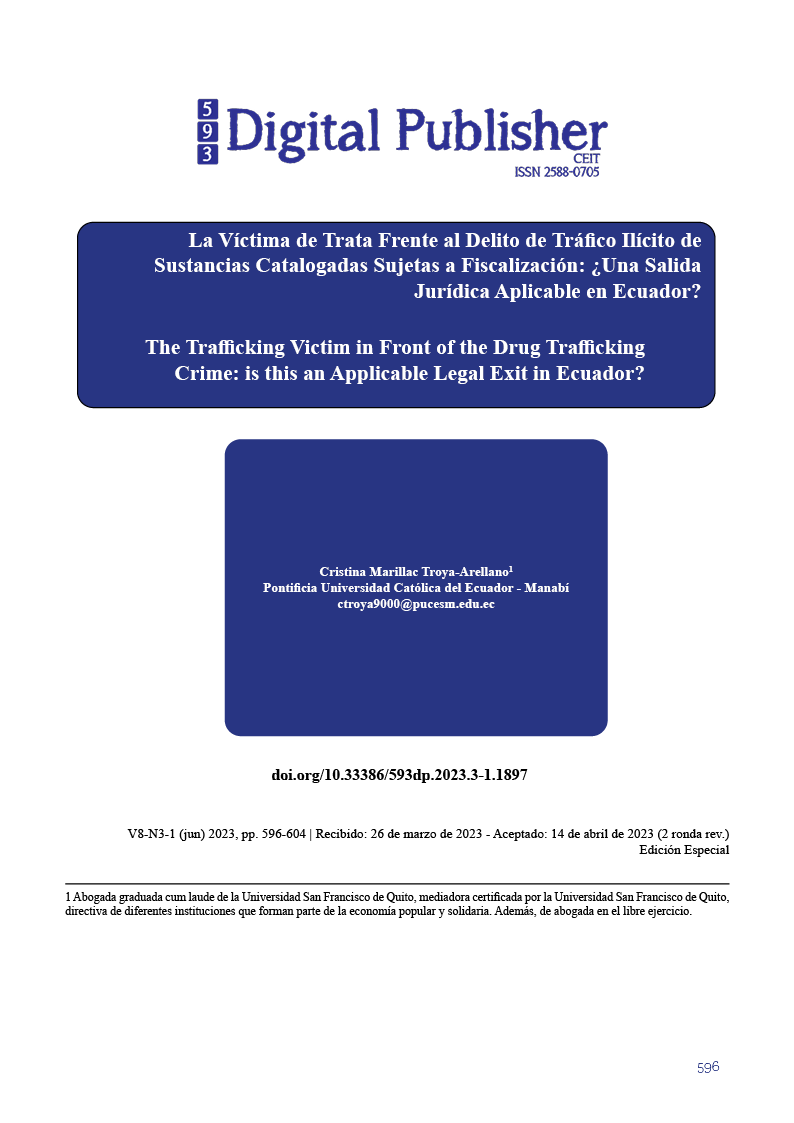The victim of trafficking in the crime of illicit trafficking of scheduled substances subject to control: A legal solution applicable in Ecuador?
Main Article Content
Abstract
This research aims to demonstrate that the "mule" of drug trafficking is a victim within the crime of trafficking in persons for sexual purposes under certain parameters established in Ecuadorian legislation comparing it with Argentine legislation. Also, the crime of drug trafficking and its acquittals will be studied, showing that the ratios decided by the chambers are based on other concepts such as: the competence of indigenous jurisdiction, principle of favorability compared to the reduction of penalties for the crime of illicit trafficking of scheduled substances subject to control (hereinafter the crime of drug trafficking), poor practice of evidence, among others. Without leaving aside, the analysis of Argentine legislation is the same that has points in common with the Ecuadorian reality and is applicable under our legal system.
It should be noted that the issue has not been studied in Ecuador in the last seven years. Rather, with the entry of the Organic Integral Penal Code (hereinafter COIP) a difference between the scales of drug trafficking was consolidated and discussion of Ecuadorian drug legislation was stopped. Indeed, it is necessary to visualize the lack of use of article 93 of the COIP on the principle of non-punishability of the victim of trafficking, which, being so broad, gives a valid argument to the defense of human drug mail by evidencing its quality as a victim. However, it is important to establish the requirements for this exemption from punishment to be assessed, such as evidence of exploitation, participation in drug trafficking as a product of abuse and consistent proportionality between the situation originated and the crime committed.
Downloads
Article Details

This work is licensed under a Creative Commons Attribution-NonCommercial-ShareAlike 4.0 International License.
1. Derechos de autor
Las obras que se publican en 593 Digital Publisher CEIT están sujetas a los siguientes términos:
1.1. 593 Digital Publisher CEIT, conserva los derechos patrimoniales (copyright) de las obras publicadas, favorece y permite la reutilización de las mismas bajo la licencia Licencia Creative Commons 4.0 de Reconocimiento-NoComercial-CompartirIgual 4.0, por lo cual se pueden copiar, usar, difundir, transmitir y exponer públicamente, siempre que:
1.1.a. Se cite la autoría y fuente original de su publicación (revista, editorial, URL).
1.1.b. No se usen para fines comerciales u onerosos.
1.1.c. Se mencione la existencia y especificaciones de esta licencia de uso.
References
Gorjón Gómez, Gabriel de Jesús, & Sauceda Villeda, Brenda Judith. (2018). Justicia restaurativa, una herramienta de paz en la resolución de conflictos comunitarios. Caso Nuevo León. Política criminal, 13(25), 548-571. https://dx.doi.org/10.4067/S0718-33992018000100548
Benavides Benalcázar, Merck Milko. (2019). La reparación integral de la víctima en el proceso penal. Revista Universidad y Sociedad, 11(5), 410-420. Epub 02 de diciembre de 2019. Recuperado en 16 de febrero de 2022, de http://scielo.sld.cu/scielo.php?script=sci_arttext&pid=S2218-36202019000500410&lng=es&tlng=pt.
Ruiz Muriel, Martha Cecilia, & Álvarez Velasco, Soledad. (2019). Excluir para proteger: la “guerra” contra la trata y el tráfico de migrantes y las nuevas lógicas de control migratorio en Ecuador. Estudios sociológicos, 37(111), 689-725. Epub 20 de febrero de 2020.https://doi.org/10.24201/es.2019v37n111.1686
Arrias Añez, Julio César De Jesús, Pupo Kairuz, Alba Rosa, & Atencio González, Rously Eedyah. (2021). Análisis crítico sobre el ordenamiento jurídico antidrogas contra el narcotráfico comparando la legislación ecuatoriana y venezolana. Dilemas contemporáneos: educación, política y valores, 8(3), 00044. Epub 11 de junio de 2021.https://doi.org/10.46377/dilemas.v8i3.2668
Real Academia de la Lengua Española, (s/f) Diccionario de la Lengua Español
Abril, K. (2013). El principio constitucional de proporcionalidad punitiva: juzgamiento de la tenencia de estupefacientes en el cantón Cuenca. Cuenca: Tesis de pregrado en formato PDF Universidad de Cuenca.
Paula Sturla Lompré, ‘‘Mulas, la cara visible del narcotráfico. Estudio sobre el tráfico de drogas a través de aeropuertos argentinos bajo la modalidad de correos humanos’’. Repositorio Institucional Digital de Acceso Abierto, Julio de 2021, pp. 106, http://ridaa.unq.edu.ar, Universidad Nacional de Quilmes, Secretaría de Posgrado, Especialización en Criminología
Andrea Giménez-Salinas Framis Laura Requena Espada Luis De La Corte Ibáñez. ¿EXISTE UN PERFIL DE DELINCUENTE ORGANIZADO? Exploración a partir de una muestra española. Obtenido de: http://criminet.ugr.es/recpc/13/recpc13-03.pdf
Sampó, Carolina. (2017). NARCOTRÁFICO Y TRATA DE PERSONAS, UNA MUESTRA DE CÓMO EL CRIMEN ORGANIZADO AVANZA EN ARGENTINA. Revista de Relaciones Internacionales, Estrategia y Seguridad, 12 (2), 207-229. https://doi.org/10.18359/ries.2774
Legislación:
Asamblea Nacional Constituyente del Ecuador. (2008). Constitución de la República del Ecuador. Registro Oficial N.º 449.
Asamblea Nacional del Ecuador. (2009). Ley Orgánica de Garantías Jurisdiccionales y Control Constitucional. Registro Oficial N. 52.
Asamblea Nacional del Ecuador. (2014). Código Orgánico Integral Penal. Registro Oficial N. 180.
Declaración Universal de los Derechos Humanos, art. 4;
Convención Americana sobre Derechos Humanos, art. 6;
Pacto Internacional de Derechos Civiles y Políticos, art. 8;
Convención sobre la Eliminación de todas las Formas de Discriminación contra la Mujer, art. 6
Jurisprudencia
Sentencia Penal Tribunal Superior de Justicia de Cataluña, Sala de lo Civil y Penal, Red 60/2021 de 02 de noviembre de 2021
Caso Palacio Urrutia y otros Vs. Ecuador, https://www.corteidh.or.cr/docs/casos/articulos/seriec_446_esp.pdf
Boletín Anual de Jurisprudencia de la Corte Constitucional del Ecuador (2015-2022) Obtenido de: https://www.corteconstitucional.gob.ec/index.php/boletines-jurisprudenciales/boletines-jurisprudenciales-2020/boletines-boletin-anual-2020.html
Sentencia N°539-2018 de la Corte Nacional de Justicia del Ecuador. Obtenido de: file:///C:/Users/Cristina/Downloads/Juicio_17282-2016-05156.pdf


